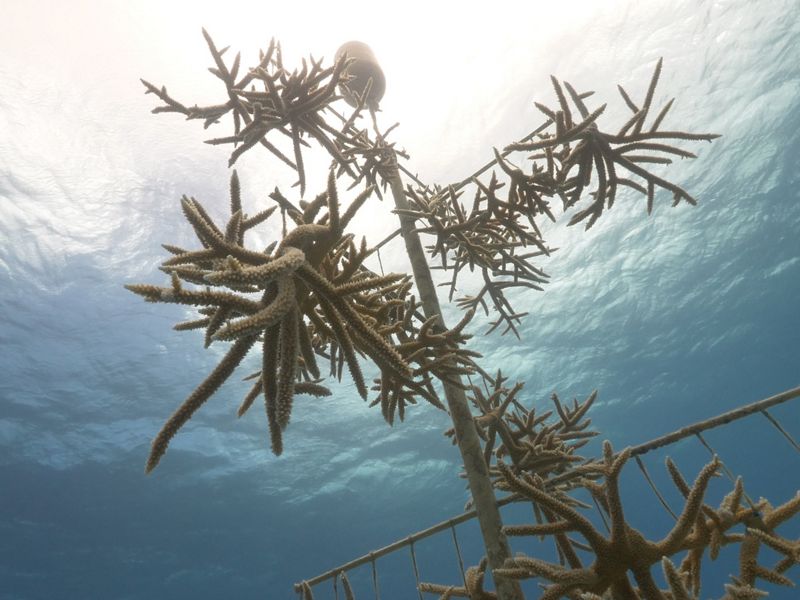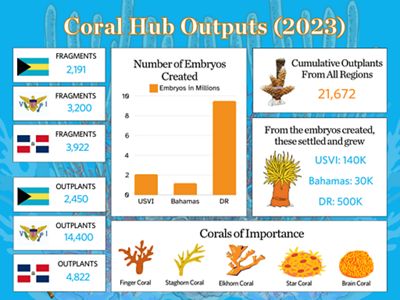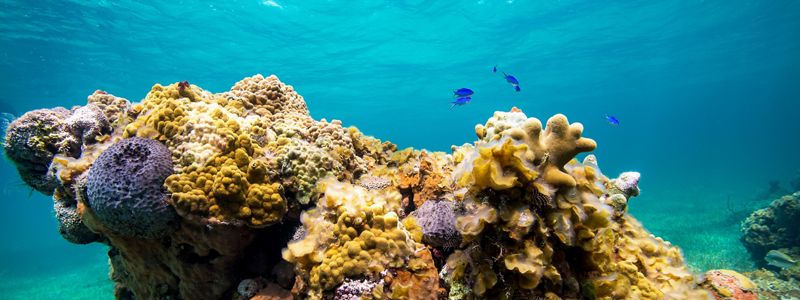
Coral Touching the Sky Staghorn coral growing in a coral nursery tree © MSJ Visuals
"You should have seen it 10 years ago", the lingering words echo in a Bahamian youth's mouth as he speaks about how coral reefs in The Bahamas have degraded over time. But this trend is not exclusive to The Bahamas. Across the Caribbean, coral reefs have suffered due to global and local stressors. Massive, region-wide decline of corals across the entire Caribbean basin have been reported, with the average stony coral cover on reefs being reduced by 80% (Gardner et al. 2003).
But why are coral reefs important? An estimated 25% of all marine life, including over 4,000 species of fish, are dependent on coral reefs at some point in their life cycle. Healthy coral reefs provide habitat, feeding, spawning and nursery grounds for over 1 million aquatic species, including commercially harvested fish species. And as the effects of climate change continue to mount, their ability to reduce wave energy and erosion is a critical line of defense for coastal regions as storm intensities increase. Moreover, their economic impacts for fisheries and tourism are in the billions for the Caribbean region and valued at $375 billion per year worldwide.
To protect and restore coral reefs, TNC is guiding effective marine management and innovating ways to accelerate coral reproduction and reef recovery. This multifaceted approach aims to restore the long-term health of coral reefs, increase their resilience to a changing climate and address the threats that have caused their deterioration. Partnering with local organizations, institutions, communities and governments, we are shaping a brighter future for these vital ecosystems that benefit more than 44 million people across the Caribbean. To achieve these goals at scale, we have established three key Coral Innovation Hubs across the region in The Bahamas, US Virgin Islands and Dominican Republic.
Through state-of-the-art lab facilities and extensive coral nurseries at these Hubs, we’re developing techniques to breed significantly more corals for restoration, with greater survival rates. These techniques include larval propagation, which helps preserve coral genetic diversity and resilience, and microfragmentation, a process that dramatically stimulates coral growth.
THE HUBS
In 2018 our first Coral Hub was established in The Bahamas at the Cape Eleuthera Institute in close collaboration with Perry Institute for Marine Science. Here, TNC and partners are working to increase the efficiency and effectiveness of facilitated sexual coral breeding and outplanting techniques. Hands-on education is offered to local students through field trips that include snorkeling to underwater coral nurseries and visits to the Institute’s research facility.
In 2023, the Hub reported more than 24 coral tree nurseries maintained with more than 1400 fragments, which makes this the biggest coral nursery in The Bahamas. Last year alone, over 600 new fragments were created from three new coral nursery sites, and over 434 corals were outplanted at four different outplanting sites across the area. In addition, over a million larvae of the important reef-building mountainous star coral (Orbicella faveolata) were raised in the lab and over 191 fragments were collected from ocean-based nurseries.

The Nature Conservancy’s U.S. Virgin Islands Coral Innovation Hub is a land-based coral nursery and laboratory based at Estate Little Princess, on St. Croix. The Hub is dedicated to advancing coral restoration science in the Caribbean through cutting-edge research, innovative technologies and strategic partnerships. From coral restoration initiatives to community engagement programs, the Hub's multifaceted approach exemplifies collaboration and innovation to restore the long-term health effects of coral reef ecosystems. In 2024, it was designated as a Coral Reef Research Center (CRRC) by the National Oceanic and Atmospheric Administration’s (NOAA) Coral Reef Conservation Program
The TNC USVI Coral Innovation Hub has demonstrated exceptional skill and effectiveness at coral conservation techniques. In 2023, this Hub reported over 2,054,250 total coral embryos created and 1,023,000 embryos reared for settlement. Of the previous figure, 139,920 total coral individuals “settled” on the reef. A sample of the species outplanted include over 500 fragments of finger coral (Porites porites), over 1200 fragments of critically endangered elkhorn coral (Acropora palmata) and over 1500 symmetrical brain coral (Pseudodiploria strigosa) from the 2023 spawning season.
Our Dominican Republic Coral Innovation Hub is jointly based at Grupo Puntacana Foundation’s (FGPC) Center for Marine Innovation with close collaboration with the NGO Fundacion Dominicana de Estudios Marinos (FUNDEMAR). Here, TNC and partners are advancing asexual coral reproduction and outplanting techniques, while offering local students hands-on education through field trips to the Hub’s lab facilities.
In 2023, this Hub reported creating over 3122 fragments from six different coral species in their terrestrial nursery. At their marine nurseries they house 40 structures focused on the critically endangered species staghorn coral (Acropora cervicornis). Over 800 fragments of critically endangered elkhorn coral (Acropora palmata) were produced from marine nurseries. More than 9.5 million coral embryos of seven different important coral species were also produced and from this figure over 500,000 coral individuals “settled” and began to grow on the reef.
Soon FGPC and FUNDEMAR will have two new facilities to further advance coral and marine research with the latest and most innovative technologies. This infrastructure is partially funded by OceanKind and TNC, and we are looking forward to further scaling up our coral work in the Dominican Republic.
As Caribbean corals continue to face various threats, it’s more essential than ever to be able to replicate effective coral restoration measures across the region and scale up our efforts to defend and restore these critical creatures.
All these Hubs have made great impacts over the years regarding coral education and restoration; millions of coral fragments have been created of various coral species, tens of thousands of outplants have been placed into the ocean, thousands of locals and partners have been able to improve their knowledge on coral conservation methods and topics and countless hours have been spent researching these fascinating creatures.
However, coral restoration impacts are not just measured in storm energy dampening or species richness. They are measured in real-world effects for local populations. Reefs restored with transplanted corals quickly see improvements regarding the presence of marine biodiversity compared to reefs that are allowed to collapse. The return of endemic marine creatures to a reef not only signals a recovering ecosystem, but it gives hope for coastal communities who depend on reefs for their livelihoods.
By restoring coral reefs, we are investing in the future of our oceans and the well-being of coastal communities around the globe. The Nature Conservancy and partners have achieved so much in the region thus far—through continued collaboration and support, a healthier Caribbean for nature and people is within our reach.
We Can’t Save Nature Without You
Sign up to receive monthly conservation news and updates from the Caribbean.











